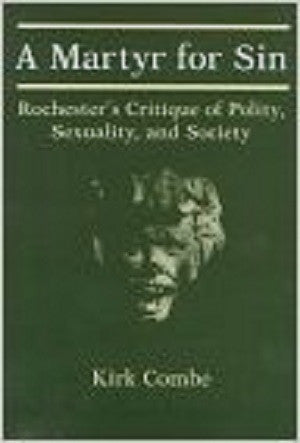Denison University presents "A Martyr for Sin: Rochester's Critique of Polity, Sexuality, and Society" by Kirk Combe.
With subtlety and finesse, Rochester's writings enmesh their reader in the power structure of Restoration patrician society and Charles II's libertine court. Within this very specific locality, the works potentially lead Rochester's contemporary readership to a realization of "historically how effects of truth are produced within discourses which in themselves are neither true nor false" (Foucault). In other words, many if not all of Rochester's writings work to debunk particular truth-producing mechanisms of Charles's court, unmask certain affectations of the luminaries of Whitehall, and expose to ridicule a range of patrician social and literary practices. Combe takes all such activities to be political in nature. At the same time, the study extends an examination of Rochester's texts in their historical setting to a consideration of what our current critical reaction to them might indicate about us.


